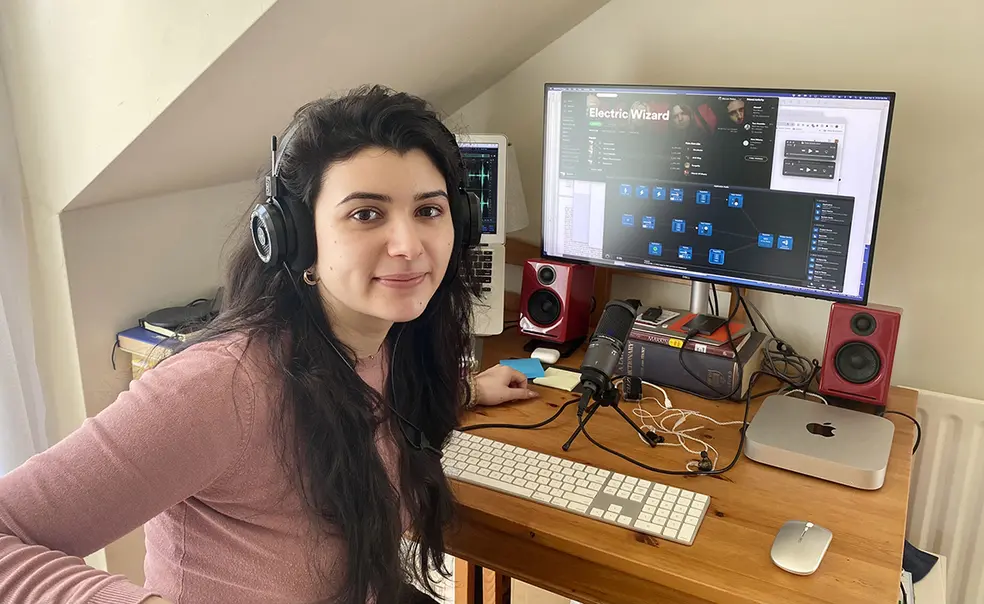Without Studio Access, WPRB Stays On Air, Live From Home
In March 2020, WPRB’s signal nearly went dark
Princeton’s student-run radio station, WPRB, has been broadcasting since 1940 and is beloved among listeners for its community-radio sound and eclectic music catalog. But in March 2020, WPRB’s signal nearly went dark.
Hanna Szabo ’22 was finishing a multivariable calculus exam on March 11, 2020, when she heard the news: Due to the COVID-19 pandemic, students had to leave campus for the remainder of the semester. As the incoming summer station manager, her first thought was of WPRB. How would it survive once students were scattered across the globe?
The next day, she gathered with the rest of the staff to make an emergency plan.
“We all huddled in our business office,” Szabo said. “No one knew what to do.” The group finally agreed that their educational adviser, Mike Lupica, would store essential items from their Bloomberg Hall basement studio in his house. By March 16, in-person operations at the station — which serves a 15,000-square-mile swath of New Jersey, eastern Pennsylvania, and Delaware — had completely shut down.
Without access to its studio, WPRB turned to an automated system.
“We were cycling through about 2,500 random MP3s,” Lupica said. “That got real boring real fast, especially for people who are accustomed to hearing creative, curated content with a human element.”
Realizing that the shuffle was no substitute for real shows, the team bought microphones, shipped them across the country to its DJs, and began an ad hoc schedule of prerecorded shows.
“It was on May 6 that WPRB returned to some semblance of new daily programming,” said Jon Solomon, a DJ who has been with WPRB for nearly 34 years. “Compared to other community radio stations that stayed dark for months and months, it was pretty incredible.”
And by the end of the summer, WPRB had figured out something better: how to host live radio shows from home, anywhere in the world.
“We’ve pretty much transitioned almost 100 percent to operating out of our transmitter site, which is in Baker’s Basin, next to Quaker Bridge Mall,” said Dante Sudilovsky ’22, WPRB’s current station manager. An automated system connects DJs with the transmitter, he explained, allowing for a near-full schedule of live broadcasts in the last three radio seasons.
“I was silently very skeptical that it was going to work,” Lupica said of the live-from-home setup, “and I have never been so excited to have been wrong.”
In many ways, it was difficult for WPRB to function without the Bloomberg Hall studio. Recruiting new members was harder without the appeal of a physical location, not to mention its large collection of records and CDs. Still, the pandemic year has brought many successes. Listeners remain loyal, sending messages of praise and support on social media, and WPRB has implemented a popular “listener chat” that allows fans to interact live with the DJ and other listeners.
In April, WPRB held its annual fundraising drive, which had not occurred since 2019 due to the pandemic. Typically an elaborate, in-person event, this year’s drive was completely virtual. Nevertheless, it reached over 1,000 pledges in 10 days, becoming the most successful one to date.
“We didn’t have the telephones and we didn’t have the station. We didn’t have that sense of community and coming together,” Sudilovsky said. “But we did our best to replicate it.”
Now, WPRB staffers are looking ahead to September, which will mark 18 months since they last gathered in person.
“We’ve been trying to talk to the administration, just to kind of scope out what’s going to happen next semester,” Szabo said. “What I can hope for is that students can be allowed to return and hang out.” She laughed. “And then, going back in the studio, we need to clean it — deep clean, vacuum every corner.”










No responses yet